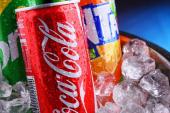Taxes on Sugar-Sweetened Beverages Linked to Lower BMI in Children
The California data suggest excise taxes are having an impact, but is the benefit strong enough to encourage more cities to try?

Children who live in cities with excise taxes on sugar-sweetened beverages tend to have lower body mass index (BMI) than those who live in cities that do not have such taxes, according to new data from California.
With both childhood obesity and consumption of sugar-sweetened beverages linked to CVD risk, several US cities have enacted taxes on these drinks over the past decade that have decreased how much people not only buy but also consume them.
For this study, published online today in JAMA Network Open, Deborah Rohm Young, PhD (Kaiser Permanente Southern California, Pasadena, CA), and colleagues found significant drops in the rates of overweight or obesity across all age groups among more than 44,000 children residing in one of four California cities with these taxes compared with demographically matched control cities. The study period spanned from 2009 to 2020, encompassing data from 6 years before the taxes were passed through 4-6 years of follow-up.
The findings should “motivate” other cities to pass excise taxes on sugar-sweetened beverages, argued Joshua Petimar, ScD (Harvard Medical School and Harvard Pilgrim Health Care Institute, Boston, MA), who commented on the study for TCTMD. “It does show that there's some health benefits to these taxes.”
Specifically, Young and colleagues included 44,771 young people (mean age at baseline 6.4 years; 49.9% female) living in cities that implemented taxes in the mid-2010s: Albany, Berkeley, Oakland, and San Francisco. The comparison group consisted of 345,428 children (mean age 6.9 years; 49.5% female) from 40 cities in California with matched population-based demographics.
After tax implementation, the mean change in BMI percentile was an absolute 1.64% lower for study versus control cities. However, there was no difference in the proportion of children with overweight or obesity between cities with taxes and those without.
Using a difference-in-difference statistical analysis, the researchers found significant percentage-point drops in BMI percentile, overweight or obesity, and obesity for children aged 2-5 as well as 6-11 years in 2017. The BMI percentile findings remained significant when only male children were analyzed as well as for Asian and white children; a similar but nonsignificant trend was observed for Hispanic children.
That said, there were no significant improvements in mean BMI percentile seen in the subgroups of children on state-subsidized insurance plans or living in US Census tracts with high household poverty.
“These findings support the importance of excise taxes in influencing purchases and consumption of beverages known to have a negative impact on health,” Young and colleagues write. “Policymakers and public health leaders should strongly consider implementing excise taxes on sugar-sweetened beverages as a lever to curtail the increase in BMI percentile among youth and overweight and obesity among youth younger than 12 years.”
To TCTMD, Young said she was surprised to not find significant results in both Black and Hispanic youth, given that prior research has indicated they tend to consume more sugary beverages. “We were also surprised that we did not find associations among people with lower incomes,” she said in an email. “Previous research has speculated that taxes would result in the greatest health gains for these groups.”
As such, Young added, “additional research is needed on how these taxes impact vulnerable communities and whether they are causally linked to a reduction in obesity. . . . It would be interesting to learn more about how taxes may be associated with people living in poorly resourced neighborhoods. We didn’t find associations, and it is important to understand how policies like sugary drinks excise taxes may influence different population subgroups.”
Barriers and Implications
Petimar said the largest barrier to more cities implementing such taxes is related to heavy resistance from beverage manufacturers. “These beverage taxes are a big threat to the food industry, to the beverage industry, and so there's a lot of lobbying that has taken place . . . to stop any progress that's being made on beverage taxes,” he said. “And unfortunately, we haven't had a new beverage tax passed in the US for a few years now.”
Notably, Petimar pointed out that “many of these policies are associated with stronger improvements in dietary behaviors than we see for almost any other kind of intervention that we that we've tried.” Just this week, for example, new research published in the Journal of the American College of Cardiology showed the potential for schoolwide interventions to curb obesity in children, but the effect was modest and the initiative itself would likely require many resources and widespread buy-in to implement.
The revenue generated from these taxes is also often put back into the community in the form of other prevention initiatives related to health and obesity, he added. “So getting the support of different members of the public health and medical communities is important to move these forward in the future.”
While some studies have demonstrated the beneficial effects of these taxes, Petimar said he would like to see more that identify changes in health outcomes, even moving beyond traditional endpoints like body weight to others such as dental decay. “There are other benefits that the beverage tax can lead to, and I think that it's important to look at,” he said, adding that meta-analyses and countrywide systematic reviews would also be welcome.
Yael L. Maxwell is Senior Medical Journalist for TCTMD and Section Editor of TCTMD's Fellows Forum. She served as the inaugural…
Read Full BioSources
Young DR, Hedderson MM, Sidell MA, et al. City-level sugar-sweetened beverage taxes and youth body mass index percentile. JAMA Network Open. 2024;7:e2424822.
Disclosures
- Young reported receiving grants from the National Institutes of Health during the conduct of the study.
- Petimar reports no relevant conflicts of interest.




Comments